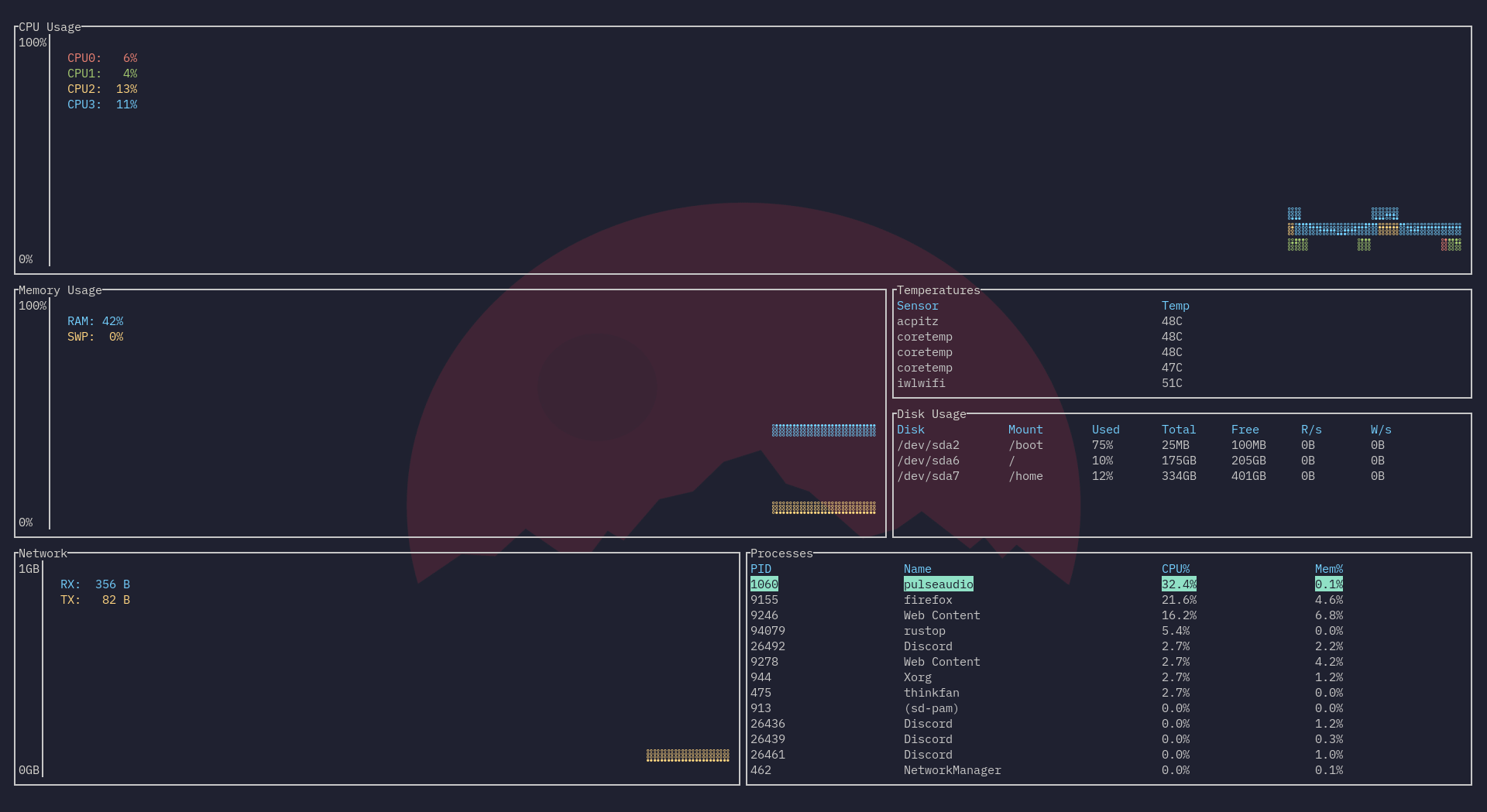| .github/ISSUE_TEMPLATE | ||
| assets | ||
| src | ||
| tests | ||
| .gitignore | ||
| .travis.yml | ||
| Cargo.toml | ||
| LICENSE | ||
| README.md | ||
| rustfmt.toml | ||
| TODO.md | ||
bottom
A top clone, written in Rust. Inspired by both gtop and gotop
 Note that the background you see is not part of the app, that's just because I use a slightly transparent terminal.
Note that the background you see is not part of the app, that's just because I use a slightly transparent terminal.
Installation
Linux
You can install by cloning and using cargo build --release, or download the pre-compiled binary in Releases. Note this needs the nightly toolchain if you are building.
Windows
You can currently install by cloning and building yourself. Note this needs the nightly toolchain if you are building.
MacOS
Currently, I'm unable to really dev or test on MacOS, so I'm not sure how well this will work, if at all. I'll try to source MacOS hardware to test this application.
Usage
Note that all options and keybinds on GitHub may reflect the current development build, and not that of the current releases. For now, refer to the crate README for documentation as of time of release.
Command line options
-
-h,--helpto show the help screen and exit (basically has all of the below CLI option info). -
-a,--avgcpuenables showing the average CPU usage on rustop. -
-m,--dot-markeruses a dot marker instead of the default braille marker. This is useful for things like Powershell which display braille markers incorrectly. -
-c,--celsiusdisplays the temperature type in Celsius. This is the default. -
-f,--fahrenheitdisplays the temperature type in Fahrenheit. This is the default. -
-k,--kelvindisplays the temperature type in Kelvin. This is the default. -
-v,--versiondisplays the version number and exits. -
-r <RATE>,--rate <RATE>will set the refresh rate in milliseconds. Pick a range from 250ms toUINT_MAX. Defaults to 1000ms, and higher values may take more resources due to more frequent polling of data, and may be less accurate in some circumstances.
Keybinds
General
-
q,Ctrl-cto quit. -
Ctrl-rto reset the screen and reset all collected data. -
fto freeze the screen from updating with new data. Pressfagain to unfreeze. Note that monitoring will still continue in the background. -
Up/k,Down/j,Left/h,Right/lto navigate between panels. -
Shift+UpandShift+Downscrolls through the list if the panel is a table (Temperature, Disks, Processes). -
Escto close a dialog window. -
?to get a help screen explaining the controls. Note all controls exceptEscto close the dialog will be disabled while this is open.
Processes Panel
-
ddto kill the selected process - I would highly recommend you to be careful using this, lest you accidentally kill the wrong process. -
cto sort by CPU usage. Sorts in descending order by default. Press again to reverse sorting order. -
mto sort by memory usage. Sorts in descending order by default. Press again to reverse sorting order. -
pto sort by PID. Sorts in ascending order by default. Press again to reverse sorting order. -
nto sort by process name. Sorts in ascending order by default. Press again to reverse sorting order.
Mouse Actions
- Scrolling currently only scrolls through the list if you are on the Processes panel. This will change in the future.
Thanks
-
As mentioned, this project is very much inspired by both gotop and gtop .
-
This application was written with the following libraries:
Why
I was looking to try writing more things in Rust, and I love the gotop tool. And thus, this project was born.
